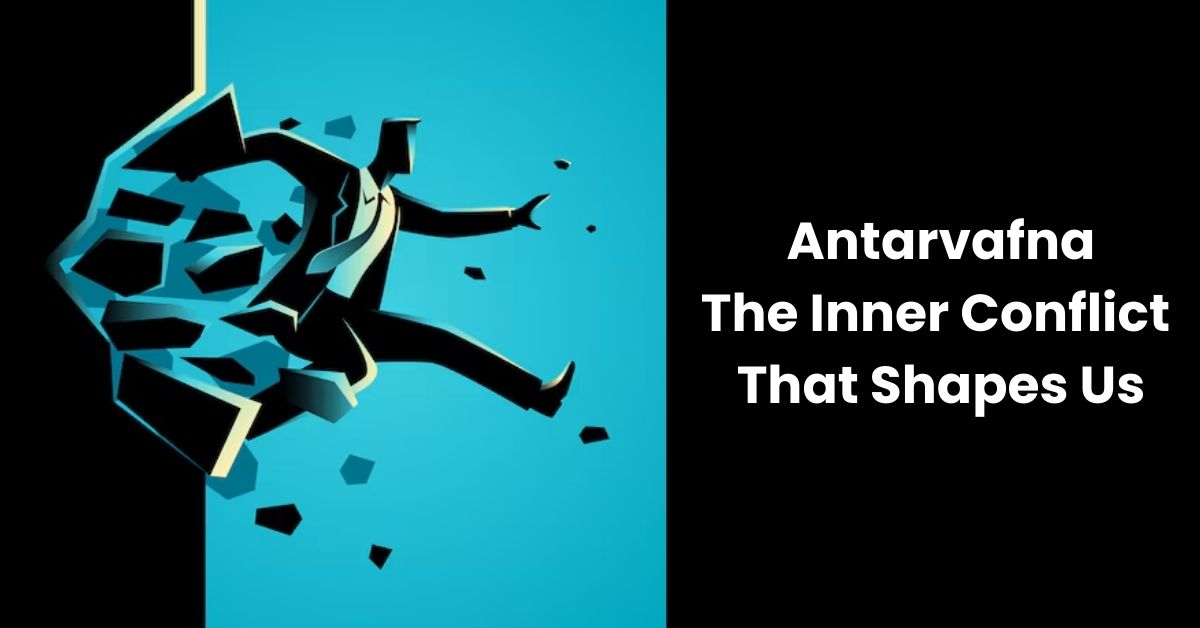Antarvafna: The Inner Conflict That Shapes Us

Life is a constant uphill struggle, with some struggles being obvious and others buried deep within. Although we tend to pay attention to the conflicts that occur in the outside world, such as in our relationships, jobs, or society, a deeper fight is going on behind the scenes. The way we think, behave, and are defined by our inner turmoil. Step right into Antarvafna’s fantastical realm. Originating in Sanskrit, this potent word captures an underlying struggle that many face but few comprehend completely.
Join me as we delve into the essence of Antarvafna and explore how embracing this inner struggle can lead to significant personal growth and self-discovery.
The meaning of Antarvafna
A deep phrase originating from Sanskrit, antarvafna captures the essence of inner conflict. The combination of the words “antar,” meaning “inside,” and “vafna,” meaning “conflict” or “battle,” offers a reflection of the inner anguish that many people go through.
This idea highlights the fact that we usually have to fight our biggest fights inside, not against other people or things. It is a gentle reminder that the path to self-improvement begins with recognising and addressing these inner struggles.
Through its deep cultural roots, Antarvafna sheds light on the universality of human experience. As a result, people are more likely to reflect on their own experiences and learn more about the complexities of their own minds as they explore the depths of their emotional landscapes.
We may have a better grasp of how this complex idea influences our behaviour, relationships, and ideas by delving further into it. Identity and resiliency are profoundly impacted by the individual’s path through their own Antarvafna.
The origins of Antarvafna
The Sanskrit language is the cradle of Antarvafna. We can get a hint of its deep significance from this old corpus of language. A combination of the terms “antar,” meaning “inside,” and “vafna,” meaning “conflict” or “battle,” the word is formed.
Throughout history, this word has encapsulated the core of the mental and emotional battles that have been fought. Many ancient writings highlight these struggles within as defining times for individual development.
A major tenet of Indian philosophy is that it is only by overcoming one’s own obstacles that one may achieve enlightenment. The journey to Antarvafna encourages people to look inside, rather than outside, for the answers to their deepest problems.
Insights like this inspire introspection and heightened awareness, which in turn pave the way for the eventual resolution of the existential conflicts we all face.
Understanding the concept of inner conflict
Everyone has to deal with inner turmoil at some point. When our wants and our ideals clash, it’s like a tug-of-war inside.
Picture yourself at a crossroads, with no idea which way to go. An powerful emotional whirlwind may be created by each option, which can evoke either dread or exhilaration. Despite how lonely it might feel, we are all in this together.
At times, we struggle with self-doubt and second-guess our choices. Do I want to do what’s safe or what makes me happy? Sometimes the explanations aren’t obvious.
In this internal struggle, feelings are crucial. Hope and frustration are like a ballet, constantly affecting each other and all we do.
Understanding our fundamental selves may begin with acknowledging this inner struggle. It reveals our deepest desires and anxieties, which mould who we are every day.
In the end, these challenges force us to develop and be more resilient by making us reflect on the fundamental facts about who we are.
How Antarvafna affects our daily lives
Every day, Antarvafna influences our choices in a subtle way. It affects our attitude to problems when we have periods of uncertainty and hesitancy.
This internal struggle can cause a struggle between wants and needs when decision-making is involved. You may be struggling to decide between following your heart and meeting your responsibilities.
Antarvafna is a heavy burden on relationships as well. When people are going through tough times inside, it might show in their relationships as misunderstandings or strained dynamics.
There is an inherent struggle even in professional routes. In many cases, the need for change and development clashes with the demand for security.
Managing these competing influences becomes an integral part of daily living. When we are aware of them, we can face uncertainty with more awareness, and we may transform conflict into a chance for self-reflection and growth.
Ways to embrace and manage Antarvafna
Being self-aware is the first step in embracing Antarvafna. Think about how you feel and what you think. One effective method for this is keeping a journal. Take the time to write out your concerns and delve into the emotions that accompany them.
Meditation and deep breathing are two examples of mindfulness techniques that can help you centre yourself in the here and now. They make it possible to see one’s own struggles without passing judgement.
Discuss your struggles in conversation with someone you trust, such as a therapist, mentor, or friend. Perspective sharing frequently reveals previously unseen pathways.
Aim for manageable, challenging, and growth-oriented mini-goals. Small wins add up to big gains in self-assurance and perseverance, so be sure to celebrate them.
Make time to be kind to yourself. Feelings of disagreement are normal and necessary for growth and self-discovery, so learn to accept them.
Conclusion
Adopting Antarvafna can lead to significant self-improvement. Even if it’s scary, this inner battle may make you stronger and more clear.
Coming face to face with our mixed emotions and ideas helps us understand ourselves better. In times of stress, our innermost wants and anxieties become apparent.
Our character is shaped by every internal struggle. It challenges our preconceptions and forces us to change in ways we couldn’t have foreseen.
Overcoming these challenges cultivates perseverance. A sense of strength grows with every obstacle overcome.
There are many facets to the complicated and ever-changing path of self-discovery. Recognising Antarvafna as a thread in the fabric of existence is a tribute to the complexity of the human experience.
When we can embrace one another’s differences, we may turn disagreement into a learning experience and a chance to become closer to ourselves and others around us.
Also Read : The Enigmatic World of Andywarhella
FAQS
1. What does the term “Antarvafna” mean?
A person’s internal problems, as opposed to their exterior conflicts, are what the term “antarvafna” refers to.
2. Where does the concept of Antarvafna originate from?
The Sanskrit roots of the word “antar” (meaning “inner”) and “vafna” (meaning “conflict” or “battle”) give rise to the English word.
3. How can I recognize my own Antarvafna?
Try to identify any troubling or perplexing ideas that keep popping into your head. Your inner conflicts might be better understood by reflecting on these feelings.
4. Why is it important to manage inner conflict?
Improving your mental health and emotional stability via effective conflict management may have a positive impact on your relationships with others and with yourself.
5. Can embracing my Antarvafna lead to positive change?
Absolutely! You may heal and improve in many areas of your life by confronting your inner difficulties directly.






